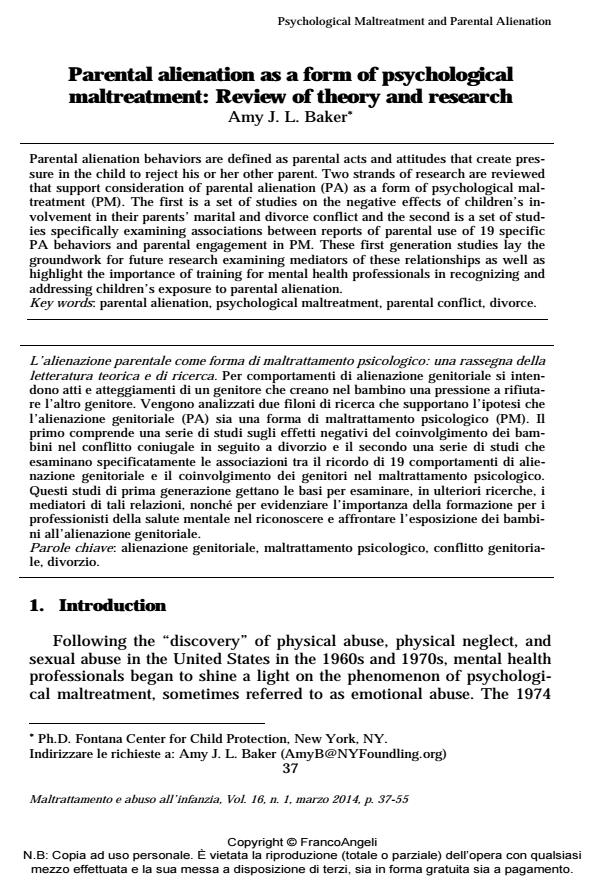Parental alienation as a form of psychological maltreatment: Review of theory and research
Titolo Rivista MALTRATTAMENTO E ABUSO ALL’INFANZIA
Autori/Curatori Amy J. L. Baker
Anno di pubblicazione 2014 Fascicolo 2014/1
Lingua Inglese Numero pagine 19 P. 37-55 Dimensione file 92 KB
DOI 10.3280/MAL2014-001003
Il DOI è il codice a barre della proprietà intellettuale: per saperne di più
clicca qui
Qui sotto puoi vedere in anteprima la prima pagina di questo articolo.
Se questo articolo ti interessa, lo puoi acquistare (e scaricare in formato pdf) seguendo le facili indicazioni per acquistare il download credit. Acquista Download Credits per scaricare questo Articolo in formato PDF

FrancoAngeli è membro della Publishers International Linking Association, Inc (PILA)associazione indipendente e non profit per facilitare (attraverso i servizi tecnologici implementati da CrossRef.org) l’accesso degli studiosi ai contenuti digitali nelle pubblicazioni professionali e scientifiche
Parental alienation behaviors are defined as parental acts and attitudes that create pressure in the child to reject his or her other parent. Two strands of research are reviewed that support consideration of parental alienation (PA) as a form of psychological maltreatment (PM). The first is a set of studies on the negative effects of children’s involvement in their parents’ marital and divorce conflict and the second is a set of studies specifically examining associations between reports of parental use of 19 specific PA behaviors and parental engagement in PM. These first generation studies lay the groundwork for future research examining mediators of these relationships as well as highlight the importance of training for mental health professionals in recognizing and addressing children’s exposure to parental alienation.
Per comportamenti di alienazione genitoriale si intendono atti e atteggiamenti di un genitore che creano nel bambino una pressione a rifiutare l’altro genitore. Vengono analizzati due filoni di ricerca che supportano l’ipotesi che l’alienazione genitoriale (PA) sia una forma di maltrattamento psicologico (PM). Il primo comprende una serie di studi sugli effetti negativi del coinvolgimento dei bambini nel conflitto coniugale in seguito a divorzio e il secondo una serie di studi che esaminano specificatamente le associazioni tra il ricordo di 19 comportamenti di alienazione genitoriale e il coinvolgimento dei genitori nel maltrattamento psicologico. Questi studi di prima generazione gettano le basi per esaminare, in ulteriori ricerche, i mediatori di tali relazioni, nonché per evidenziare l’importanza della formazione per i professionisti della salute mentale nel riconoscere e affrontare l’esposizione dei bambini all’alienazione genitoriale.
Parole chiave:Alienazione genitoriale, maltrattamento psicologico, conflitto genitoriale, divorzio
- Curare la rottura delle relazioni genitore-figlio nelle situazioni di alta conflittualità Anna Lubrano Lavadera, in MALTRATTAMENTO E ABUSO ALL'INFANZIA 1/2017 pp.29
DOI: 10.3280/MAL2017-001003 - Handbook of Interpersonal Violence and Abuse Across the Lifespan Simring Milchman Madelyn, pp.1607 (ISBN:978-3-319-89998-5)
- L'intervento nei casi di alienazione genitoriale: una rassegna sistematica della letteratura Maria Cristina Verrocchio, Daniela Marchetti, in MALTRATTAMENTO E ABUSO ALL'INFANZIA 1/2017 pp.67
DOI: 10.3280/MAL2017-001005 - Handbook of Interpersonal Violence and Abuse Across the Lifespan Madelyn Simring Milchman, pp.1 (ISBN:978-3-319-62122-7)
- Handbook of Interpersonal Violence and Abuse Across the Lifespan Madelyn Simring Milchman, pp.1 (ISBN:978-3-319-62122-7)
- Caratteristiche individuali e dinamiche relazionali nel rifiuto genitoriale: un confronto tra gruppi Anna Lubrano Lavandera, Michela Criscuolo, Laura Carla Galante, in MALTRATTAMENTO E ABUSO ALL'INFANZIA 3/2017 pp.79
DOI: 10.3280/MAL2016-003005 - Powerless to parent; powerless to protect: The experiences of alienated parents in the UK Sue Whitcombe, in MALTRATTAMENTO E ABUSO ALL'INFANZIA 1/2017 pp.47
DOI: 10.3280/MAL2017-001004 - How far has parental alienation research progressed toward achieving scientific validity? Madelyn Simring Milchman, in Journal of Child Custody /2019 pp.115
DOI: 10.1080/15379418.2019.1614511
Amy J. L. Baker, Parental alienation as a form of psychological maltreatment: Review of theory and research in "MALTRATTAMENTO E ABUSO ALL’INFANZIA" 1/2014, pp 37-55, DOI: 10.3280/MAL2014-001003